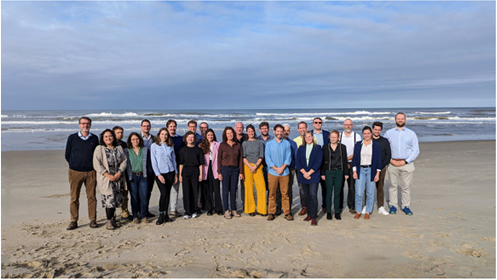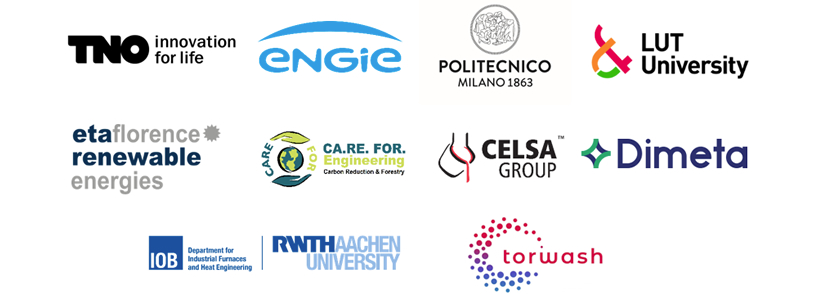BUTTERFLY is a new EU funded project that delivers a circular, cost-effective and flexible production process of advanced biofuels and renewable fuels, targeting the off-grid energy supply, the steel industry and heavy-duty transport.
One of the priorities of the European Green Deal is the transition of Europe into the first climate-neutral continent by 2050.
To achieve this target, the European Union is required to reshape the energy system to become affordable, more efficient and circular, and to progressively achieve ambitious goals both in terms of renewable energy share and reduction of energy consumption.
Bioenergy will play a crucial role in this transition, supporting the achievement of the 32% renewable energy goal by 2030 and boosting renewable energy and feedstocks in sectors such as transport, off-grid energy and industry.
BUTTERFLY fits into this evolving context by providing multiple innovations in the production of advanced biofuels and renewable fuels, in line with the ambitions of the EU Green Deal. The project is carried out by an international consortium including industries, utility companies, research organizations and SMEs, coordinated by Dutch-based TNO.
Through the validation of three different residual feedstock families, this project will advance a co-production process of rDME (renewable & recycled carbon DiMethyl Ether) and SNG (Synthetic Natural Gas), with applications in the steel industry, off-grid energy supply and heavy-duty transport.

Circular and cost-effective value chains
BUTTERFLY will demonstrate the use of three different waste and residual feedstock families (lignocellulosic biomass, industrial and organic waste) in order to produce a tuneable production ratio between SNG and rDME. The diversification and valorisation of these new residual feedstocks will decrease production costs of the advanced and renewable fuels, while substituting fossil fuels in energy demanding applications and reducing GHG emissions arising from those sectors.
Innovative production process
The project will advance innovative solutions that have not been implemented so far, such as the integration of the SEDMES (Sorption-Enhanced DME Synthesis) process with a gasifier in a real operating environment (TRL-Technology Readiness Level 7) to produce rDME and the connection of SEDMES upstream a methanation technology to valorise off-gas from rDME synthesis into SNG. These cutting-edge technologies will allow multiple and flexible process configurations from max rDME to max SNG production, including tuneable ratios of products. The flexibility of this process will ensure adaptability to market demand and feedstock availability, as well as maximum fuel production and costs reduction, while the circularity feature will improve carbon efficiency towards 97% and biomass-to-fuel conversion efficiency by 15% compared to the state-of-the-art.
Boost the scale-up of advanced biofuels and renewable fuels
The connection of multiple innovative technologies and the tuneable production ratio between rDME and SNG will improve yield and efficiency production performance, with an increase of gasification and methanation plant size. Indeed, BUTTERFLY will upgrade SEDMES technology connection to indirect gasification from laboratory testing in relevant environment (TRL5) to a verification in relevant industrial environment (TRL6) and SEDMES process upstream methanation to a real operating environment (TRL7), boosting the scale-up of advanced biofuels and renewable fuels. This advancement will enable meeting the short and medium-term demand for renewable fuels in energy and transport: rDME and SNG could replace LPG and diesel used in off-grid domestic, industrial and commercial heating, steel industry and heavy-duty transportation (including marine sector).

About BUTTERFLY
BUTTERFLY – Biomass Utilized To The Extended portfolio of Renewable Fuels with Large Yields is a Horizon Europe Innovation Action started on 1 July 2023 that will continue until November 30, 2026.
Partners
The BUTTERFLY project is coordinated by Netherlands Organisation for Applied Scientific Research (TNO) and has a consortium of 10 partners from 7 different EU countries.

Contact
André van Zomeren (Project Coordinator – TNO)
E-Mail: andre.vanzomeren@tno.nl

This project has received funding from the European Union’s Horizon Europe Research and Innovation Programme under Grant Agreement No. 101118241. Views and opinions expressed are however those of the author(s) only and do not necessarily reflect those of the European Union. Neither the European Union nor the granting authority can be held responsible for them.
Source
BUTTERFLY project, press release, 2023-11-22.
Supplier
Celsa
Dimeta
ENGIE Services
European Union
LUT University
Politecnico di Milano (POLIMI)
Rheinisch-Westfälische Technische Hochschule Aachen (RWTH)
TNO
Share
Renewable Carbon News – Daily Newsletter
Subscribe to our daily email newsletter – the world's leading newsletter on renewable materials and chemicals









